FolkWorld article by Susanne
Kalweit:
He never tires of the road
Andy Irvine at 60
Never
tire of the road
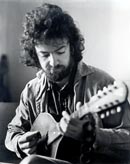 Never
tire of the rolling wheel
Never
tire of the rolling wheel
Never tire of the ways of the world
Way out yonder is a-calling me
And the dark road leads me onwards
And the highway, that's my code
And the lonesome voice that I heard said
Never tire of the road
I was
just a small town country boy
When I left that country town
Route 66 to the Westward
And hopped an old freight down
California here I come
By the side door Pullman and the sunburnt thumb
And they called us Okies, lowdown bums
And the police on us frowned
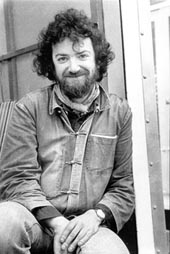 California
to the New York Island
California
to the New York Island
Me and my guitar
And we played in many a hobo jungle
Many a skid row bar
Standing out in the wind and the rain
That lonesome whistle is a sweet refrain
When you are waiting for some old freight train
That carries an empty car.
Don't
let them ever fool you
Or take you by surprise
That dirty smell of a politician
And the man with the greed in his eyes
One big union, that's our plan
And the IWW"s your only man
The flames of discontent we'll fan
For the cause that never dies
The above song was written for Woody Guthrie, but it also
says a lot about its author Andy Irvine. Not only do his lifelong reverence
for Woody, his championing of those who work for small wages, his admiration
of the "Wobbly" movement - the International Workers of the World - and his
distrust of politicians shine through; "never tire of the road" could serve
as the guiding motto of Andy Irvine's life and career. He has always delighted
in travelling, it seems, and he also appears to have found it hard to put down
roots.
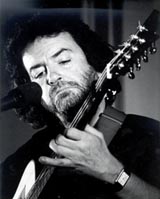 Looking
at him it's not easy to believe Andy has just turned sixty. On the other hand,
he seems to have been around on the folk scene forever. His musical career is
associated with some of the most illustrious names to come out of Ireland: Sweeney's
Men, Planxty, De Dannan, Paul Brady, Patrick Street. He is also a highly respected
soloist both as a singer and as an instrumentalist.
Looking
at him it's not easy to believe Andy has just turned sixty. On the other hand,
he seems to have been around on the folk scene forever. His musical career is
associated with some of the most illustrious names to come out of Ireland: Sweeney's
Men, Planxty, De Dannan, Paul Brady, Patrick Street. He is also a highly respected
soloist both as a singer and as an instrumentalist.
I undertook to interview Andy Irvine at the Tanz- und Folkfest Rudolstadt
in 2001. He claimed not to be in the mood for interviewing as he was scheduled
that afternoon for a talk imaginatively titled "Andy Irvine: From a folksinger's
life" (which helped this article along considerably). Reluctantly, I switched
off my tape recorder. It was then he started to talk, and to this day I could
kick myself for not switching it back on again!
The talk ahead triggered memories of his travels in the Balkans in the Seventies,
a carefree time when he discovered a new kind of music, found new friends and
fell in love with a girl for all the wrong reasons. I think what he said was:
"Although I did really love her while it lasted I fell in love as much with
what she stood for, you understand - with her country, her background, the whole
atmosphere."
His thoughts switched to his love of books, how he doesn't like being interrupted
once he has found an absorbing one and can go on reading for days on end. He
particularly likes history books and biographies. This is where he finds much
of the raw material for such songs as A Prince Among Men (about an unnamed
miner), Raoul Wallenberg (about the Swedish diplomat who saved thousands of
Jewish lives during World War II and was, it now seems, arrested and killed
by the Soviet secret police), Forgotten Hero (about Michael Davitt, the
founder of the 19th century Irish Land League), Gladiators (about some
members of the Industrial Workers of the World who left their mark on history).
The IWW is a particular concern of his, and he has been a member for a few years
now.
Andy has a very well organised website (http://www.andyirvine.com)
which, he says, was put together for him and is run by a fan, Kate Akers. It,
too, has helped with this article, because once it was there Andy decided to
include something autobiographical.
"I thought I'd better write a page of who I am. And suddenly I'd written about
five pages, and I was still only in my childhood. So I thought - no no no, you've
got to try and condense this! But I couldn't get it boxed. So I thought, well,
in that case I might as well write, a not-brief synopsis of who I am."
He ended up with nine chapters. They gave him the incentive to start on his
autobiography, which he is writing at the moment. "I'm not doing it for anything
but personal reasons, and I have no idea when it will be finished. I think it
will be quite nice for my children - they are in their twenties. I know from
experience that in your twenties you have your own life to live. You don't worry
very much about your parents and who they were - who they are. So, somewhere
in their forties they'll be pleased that I left them a record." Incidentally,
this was the only time that whole afternoon that he mentioned his family, other
than indicating that his marriage had been a casualty of his travelling lifestyle.
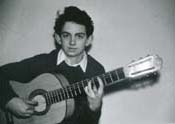 Andy
Irvine comes across almost as two different people: one, distant and withdrawn,
preferring to be left alone; the other, outgoing, trusting and eager for every
new thing life might hold in store. Maybe it's because he is a Gemini, but certainly
his childhood in London must have played a part.
Andy
Irvine comes across almost as two different people: one, distant and withdrawn,
preferring to be left alone; the other, outgoing, trusting and eager for every
new thing life might hold in store. Maybe it's because he is a Gemini, but certainly
his childhood in London must have played a part.
He describes his family as "middle class / bohemian" - his father being a
chartered accountant from Glasgow, a "strange" man who used to beat his young
son, his mother an actress from County Antrim who went on playing roles all
her life and often used her embarrassed son as an audience. "I was the only
person in the world who didn't appreciate my mother's talent, which I'm really
bitterly sad about - because if any of my talent is inherited it's not from
my father. So I owe her a great deal of gratitude, and when I was a small boy
I didn't in any way show that."
He also had a half-sister. Due apparently to tensions within the family he was
sent away to boarding school at a very early age - which explains why he has
very few memories of his early childhood. "I think I was in a state of trauma
from the age of three-and-a-half to about nine or ten." He made all this sound
funny in his talk, but it also came across as a very sad time for him.
Andrew - as he was always called by his family - became a child prodigy at
nine, not as a musician but as an actor. His debut was in a 1955 film starring
Gina Lollobrigida. "It wasn't a very good film, and I never did meet Gina, but
I was good, you know. It is very easy to act when you're that age." This feat
gave him a better standing among the boys at school and boosted his self-confidence.
Later on, when he was offered a part in what he calls a "children's soap opera"
he was able to leave the boarding-school that he loathed and pursue his career
in stage shows and TV productions.
 His
musical education had been provided by a wind-up gramophone and a hoard of "half-broken
seventy-eights" as well as by his mother's singing of her old stage songs. By
the age of fifteen all his friends were into rock 'n' roll, but "I was waiting
for the kind of music that I liked, and it didn't appear". Finally, in 1956,
he discovered Lonnie Donegan and Skiffle, then Woody Guthrie. "I didn't know
much about Woody. I'd seen his name on the back of a Lonnie Donegan cover and
I thought, what a great name! I'd love to be called Woody!"
His
musical education had been provided by a wind-up gramophone and a hoard of "half-broken
seventy-eights" as well as by his mother's singing of her old stage songs. By
the age of fifteen all his friends were into rock 'n' roll, but "I was waiting
for the kind of music that I liked, and it didn't appear". Finally, in 1956,
he discovered Lonnie Donegan and Skiffle, then Woody Guthrie. "I didn't know
much about Woody. I'd seen his name on the back of a Lonnie Donegan cover and
I thought, what a great name! I'd love to be called Woody!"
After finding one of Woody's albums in a record shop, Andy tried to write to
him. "I sent him this air mail letter (which I still have because it came back
to me) to 'Woody Guthrie, USA'. - So Woody kind of took over my life in 1958."
He discovered that his hero was in hospital in New Jersey, suffering from an
incurable wasting disease, Huntingdon's. His next letter was answered by Sid
Gleason who, with her husband Bob, looked after Woody. She would relay young
Andy's questions to him and write down the answers.
"I used to write him really long letters. He was an outlet for me. My home life
wasn't very happy - my parents didn't get on very well, they drank much too
much and had fights. Now, Sid seemed really nice, really motherly, and I thought,
I'd like to go over there and live with them! I could meet Woody and be part
of that scene!" The Gleasons seem to have agreed to the plan. Sid even asked
permission to sign her letters 'Mom', and she was the first person to call him
Andy. By the time he was seventeen his parents were resigned to letting him
go to the States in search of a new family.
It never happened, though. By this time, he had also met Ramblin' Jack Elliott
in London. "He had actually travelled with Woody, and he was the nearest thing
you could get to Woody. I desperately wanted to talk to him, but he was surrounded
by people." Young Andy had an idea: "I'll wait outside and stalk him and his
wife, find out where he lives, and then send him a letter. So I did - every
bus they got on I got on behind them, every train they got on I got on behind
them. Eventually they got to this house, and I ran up to the door - right, it's
number 13! Whatever the address was."
Jack Elliott rang him to invite him over. "I'm sure he must, at some stage
in the next two months, have wished he'd never made that phone call, because
every morning at about eight o'clock I'd cycle over to his house, knock on the
door, and either himself or his wife would open the door and go [drowsily],
'Oh, it's you!', and I'd sit on the end of their bed until they got up - which
must have been a real pain!"
 Another
constant visitor was Davy Graham, who would practise on Jack's guitars for hours.
Andy had started playing the mandolin, and he and Jack made tapes together for
Woody to listen to. "We sang This Land Is Your Land or something, and I was
doing the Cisco Houston harmony and he was being Jack Elliott and doing the
guitar and the vocal. And he looked at me and in amazement he said, 'Jeez, Andy,
you sound more like Woody than I do!' And I thought, "Ahhhhhhh, that's fantastic!'
because Woody had said to him, 'Jeez, Jack you sound more like me than I do'."
Another
constant visitor was Davy Graham, who would practise on Jack's guitars for hours.
Andy had started playing the mandolin, and he and Jack made tapes together for
Woody to listen to. "We sang This Land Is Your Land or something, and I was
doing the Cisco Houston harmony and he was being Jack Elliott and doing the
guitar and the vocal. And he looked at me and in amazement he said, 'Jeez, Andy,
you sound more like Woody than I do!' And I thought, "Ahhhhhhh, that's fantastic!'
because Woody had said to him, 'Jeez, Jack you sound more like me than I do'."
He realised there was music beyond Woody when he discovered a two-LP collection
of 'old-timey' American folk music by Harry Smith on Folkways Records. "It was
what had come down to the American people from the settlers who had brought
pieces of their own folk music from various different countries. I thought it
was really great, because much of it was quite primitive, in a positive way."
He believes it has had quite an influence on his idiosyncratic musical style.
By the early '60s he found that acting didn't come as naturally to the young
man as it had to the child. He became self-conscious and began to hate acting,
though he avoided letting his parents know. His dream of joining Woody in the
States faded when his mother died; at the same time, he was offered a role he
felt he couldn't refuse in a BBC radio series. The money and the fact that he
didn't have to learn his lines and only act with his voice kept him going. Also,
he had found a new field of interest.
"I'd started going to Ireland at this time and I found a whole bunch of people
who were really into the same kind of thing as I was. It wasn't just the music,
it was the lifestyle - a combination of bohemian-ness and socialism. I'd picked
up on socialism from Woody early on. (How did I avoid being beaten up by fascists
in London at various demonstrations we had at that time?) We were outside the
mainstream of society in a way. We were wearing clothes like - well, more or
less like the ones I've got on now [jeans, sweatshirt, denim jacket]. People
like Johnny Moynihan were really good friends of mine, and I decided to go and
live in Dublin. I couldn't give up acting because that was my meal ticket, and
I acted in Dublin for a couple of years until this kind of bohemian life became
complete. I lived on nothing. If it hadn't been for a certain pub called O'Donoghue's
I'm sure half of us would have starved. I eventually got a flat opposite O'Donoghue's
and would go in there in the morning and Maureen O'Donoghue would give me a
bowl of soup and a pint. It was a fantastic life!"
It was, it seems, a life ruled by drink and music. Andy started singing with
Johnny Moynihan and others.
"We were so idealistic that we didn't like to play for money - but we didn't
like to get ripped off as well. We got a gig out in the Abbey Tavern in Holt
once. I was singing this great long ballad, I think it was The House Carpenter.
Halfway through Johnny leaned over and whispered into my ear - he could scarcely
stop from laughing, and he said, 'Andy, there isn't one person in the place
listening to you!' I continued singing with knitted eyebrows, and I looked up,
and I looked around - and there wasn't one person listening, not even ONE! That
was the beginning of what they called the ballad boom, and if you didn't sing
'We're all off to Dublin in the green, in the green' - and we didn't - then
you were something else."
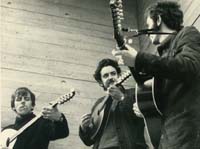 From
this position, Andy, Johnny and Joe Dolan formed Sweeney's Men in 1966. Quite
suddenly, in 1967, they had a hit single. Joe Dolan left and was replaced with
Terry Woods. "That was the end of an era. Up until then we'd been very freewheeling,
very happy-go-lucky. Now Johnny said, 'You know, it's a going concern, we are
making a living!' "
From
this position, Andy, Johnny and Joe Dolan formed Sweeney's Men in 1966. Quite
suddenly, in 1967, they had a hit single. Joe Dolan left and was replaced with
Terry Woods. "That was the end of an era. Up until then we'd been very freewheeling,
very happy-go-lucky. Now Johnny said, 'You know, it's a going concern, we are
making a living!' "
" This was probably the point where I became a professional musician. It
changed my attitude a little bit, but it hasn't changed anything else. The good
times of Sweeney's Men were definitely the early days. After that it became
a bit more of a job of work. We had another hit in 1967, and we made an album
in 1968. I'd had enough by this time. I mean, we were playing in dance-halls
- the money was good, you'd do about twenty minutes as a special spot in this
night, but it was a gruesome scene, looking back on it!"
Andy lasted for another year before a completely new interest took over. He
was bitten by the travelling bug. "People realised that you didn't actually
need money to travel. All you needed was a bit of wit and a passport. I wanted
to go somewhere exciting, but I didn't want to go that far - I thought, that's
a bit too exciting! I decided I would go to Bulgaria and Roumania, countries
that were completely unknown. They had no tourist industry. So one bright May
morning I set out from the North Wall in Dublin. Loads of people came down to
wave me off."
He and his girlfriend (later to be his wife) Muriel spent about a year and
a half travelling around Bulgaria, Yugoslavia and Roumania. Talking about this
period, Andy uses phrases like "it's all a blur", "we were really like a rolling
stone". There was no fixed plan, just drifting about, sleeping rough, playing
music, and learning about the music of his hosts. He carried a mandolin, and
being a musician helped him get along with ordinary people as well as with border
guards and the like.
He found it quite hard to settle back into life in Ireland afterwards. The
Dublin music scene had seen changes of its own while he had been away, and his
tastes were again outside the mainstream.
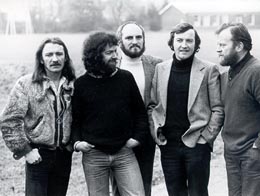 "I
fell in love with Bulgarian music. I tried very hard to get people in Ireland
to play this music, and other musicians used to avoid me because they were expecting
me to say, 'Eh, come and play Bulgarian music with me!' like a loony."
"I
fell in love with Bulgarian music. I tried very hard to get people in Ireland
to play this music, and other musicians used to avoid me because they were expecting
me to say, 'Eh, come and play Bulgarian music with me!' like a loony."
Alistair Russell heard him in Germany around this time: "I remember the young
Andy Irvine, stopping off in 1971 to do a gig in Munich on his way back from
the Balkans, about to join a new band called Planxty. The German audience was
a little perplexed by his music at that time!"
Another outcome of his Balkan adventure was the East Wind album, for which
Davy Spillane joined him, but it probably isn't unfair to say that this passion
for Balkan music has to a greater or lesser extent coloured everything Andy
has written since.
The rest is history, as they say: He became - and has remained - a major force
on the Irish folk scene, whether as a member of Planxty and Patrick Street,
in partnership with Paul Brady or as a singer/songwriter and guitarist on his
own. In 2001 he won The Hall of Fame Award of the Fiddler's Green Festival at
Rostrevor, and now he is off to new musical shores with his band Mozaic, a 'fusion'
project. His partners in Mozaic are Donal Lunny, Bruce Molsky, Nikola Parov
and Rens van der Zalm. They have toured Australia to great acclaim, and Andy
hopes the band will be an ongoing project.
For discography, autobiography and up-to-date info see http://www.andyirvine.com
Photo Credit: All photos are from Andy Irvine's website, at www.andyirvine.com
(1 and 4) Andy 1982; (2 and 5) Andy today; (3) Andy ca. 1959; (6) Sweeney's
Men in 1968; (7) Planxty in 1978
Back to the content of FolkWorld Features
To the content of FolkWorld No. 23
© The Mollis - Editors
of FolkWorld; Published 9/2002
All material published in FolkWorld is © The
Author via FolkWorld. Storage for private use is allowed and welcome. Reviews
and extracts of up to 200 words may be freely quoted and reproduced, if source
and author are acknowledged. For any other reproduction please ask the Editors
for permission. Although any external links from FolkWorld are chosen with greatest
care, FolkWorld and its editors do not take any responsibility for the content
of the linked external websites.
FolkWorld - Home of European Music

Layout & Idea of FolkWorld © The
Mollis - Editors of FolkWorld
Never tire of the rolling wheel
California to the New York Island
 Looking
at him it's not easy to believe Andy has just turned sixty. On the other hand,
he seems to have been around on the folk scene forever. His musical career is
associated with some of the most illustrious names to come out of Ireland: Sweeney's
Men, Planxty, De Dannan, Paul Brady, Patrick Street. He is also a highly respected
soloist both as a singer and as an instrumentalist.
Looking
at him it's not easy to believe Andy has just turned sixty. On the other hand,
he seems to have been around on the folk scene forever. His musical career is
associated with some of the most illustrious names to come out of Ireland: Sweeney's
Men, Planxty, De Dannan, Paul Brady, Patrick Street. He is also a highly respected
soloist both as a singer and as an instrumentalist.
 Andy
Irvine comes across almost as two different people: one, distant and withdrawn,
preferring to be left alone; the other, outgoing, trusting and eager for every
new thing life might hold in store. Maybe it's because he is a Gemini, but certainly
his childhood in London must have played a part.
Andy
Irvine comes across almost as two different people: one, distant and withdrawn,
preferring to be left alone; the other, outgoing, trusting and eager for every
new thing life might hold in store. Maybe it's because he is a Gemini, but certainly
his childhood in London must have played a part.
 From
this position, Andy, Johnny and Joe Dolan formed Sweeney's Men in 1966. Quite
suddenly, in 1967, they had a hit single. Joe Dolan left and was replaced with
Terry Woods. "That was the end of an era. Up until then we'd been very freewheeling,
very happy-go-lucky. Now Johnny said, 'You know, it's a going concern, we are
making a living!' "
From
this position, Andy, Johnny and Joe Dolan formed Sweeney's Men in 1966. Quite
suddenly, in 1967, they had a hit single. Joe Dolan left and was replaced with
Terry Woods. "That was the end of an era. Up until then we'd been very freewheeling,
very happy-go-lucky. Now Johnny said, 'You know, it's a going concern, we are
making a living!' " "I
fell in love with Bulgarian music. I tried very hard to get people in Ireland
to play this music, and other musicians used to avoid me because they were expecting
me to say, 'Eh, come and play Bulgarian music with me!' like a loony."
"I
fell in love with Bulgarian music. I tried very hard to get people in Ireland
to play this music, and other musicians used to avoid me because they were expecting
me to say, 'Eh, come and play Bulgarian music with me!' like a loony."
